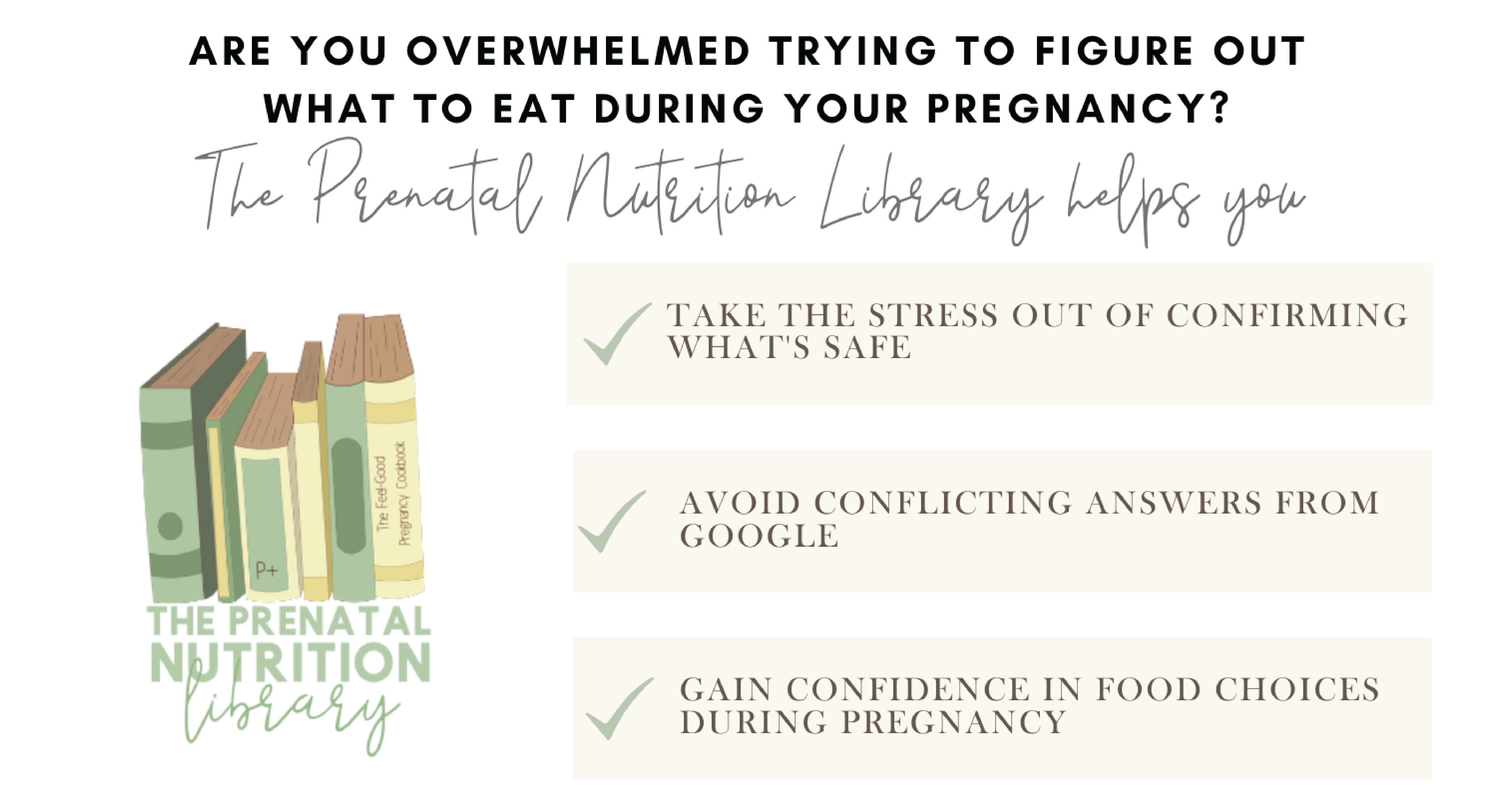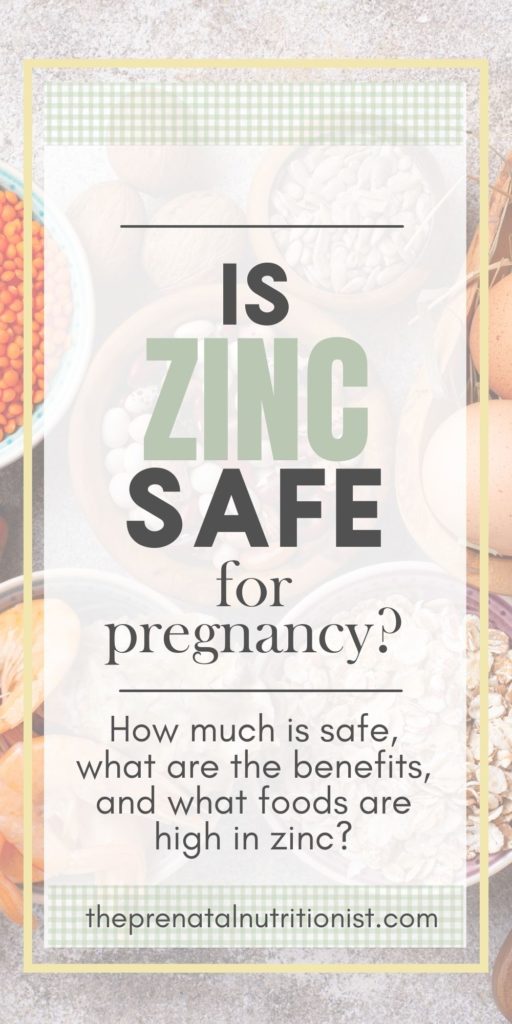
Zinc is a trace mineral, meaning the body needs it only in small amounts. It is an important mineral for overall health. Humans can’t synthesize it on their own, so it has to come from your diet or a supplement. This means, spoiler, zinc is a safe and important nutrient for pregnancy.
Unfortunately, zinc deficiency is a concern, even in developing countries. Pregnant women, in particular, are more prone to zinc deficiency. During pregnancy and lactation, women require even more zinc per day. Zinc deficiency has been linked to low birth weight and other adverse outcomes during pregnancy, labor, and delivery. Some symptoms of zinc deficiency could include an impaired sense of taste or smell, loss of appetite, hair loss, diarrhea, and a weakened immune system.
If you are concerned about the amount of zinc you get daily, I recommend focusing on incorporating more food sources and then talking to your doctor or dietitian before you consider taking a zinc supplement. In the meantime, read through this post to learn about the safety of zinc during pregnancy.
Is Zinc Safe During Pregnancy?
Zinc is a mineral that naturally occurs in many types of foods. Whole foods are, of course, safe options and sources of zinc for pregnancy! Here are a few other important things to note.
Again, for pregnant women, the safest way to get the recommended daily amount of zinc is from natural food sources. A well-balanced diet that includes many natural food sources of zinc typically provides pregnant women with enough zinc.
As for zinc supplementation, it is recommended that your prenatal vitamin includes zinc. Some individuals, such as those diagnosed with depression, anxiety, or a history of postpartum depression, may benefit from a separate zinc supplement. However, it is possible to get too much zinc. Always discuss adding a new supplement with your healthcare provider!
How Much Zinc Is Safe During Pregnancy?
The Recommend Dietary Allowance (RDA) for ages 14-18 is 13 mg per day, and for ages 19 years and older is 11 mg/per day during pregnancy. That’s a notable increase from the 8 mg per day recommended amounts for non-pregnant women aged 19 and older.
Vegetarians may need up to 50% more zinc due to poor absorption in plant foods. Keep in mind that fruits and vegetables are a relatively poor source of zinc. Keep reading to learn the best sources of zinc!
Effects Of Too Much Zinc During Pregnancy
You won’t overdo zinc by eating real, whole food sources. However, you can get too much supplemental zinc. Symptoms of zinc toxicity could include:
- Nausea
- Vomiting
- Stomach pain
- Diarrhea
- Headaches
The tolerable upper limit (UL) for pregnant women is 40 mg of zinc daily. This can lead to insufficient “good” cholesterol, copper deficiency, and decreased immune function. If you are supplementing with zinc for any reason, be sure to do so under your doctor’s or dietitian’s supervision.
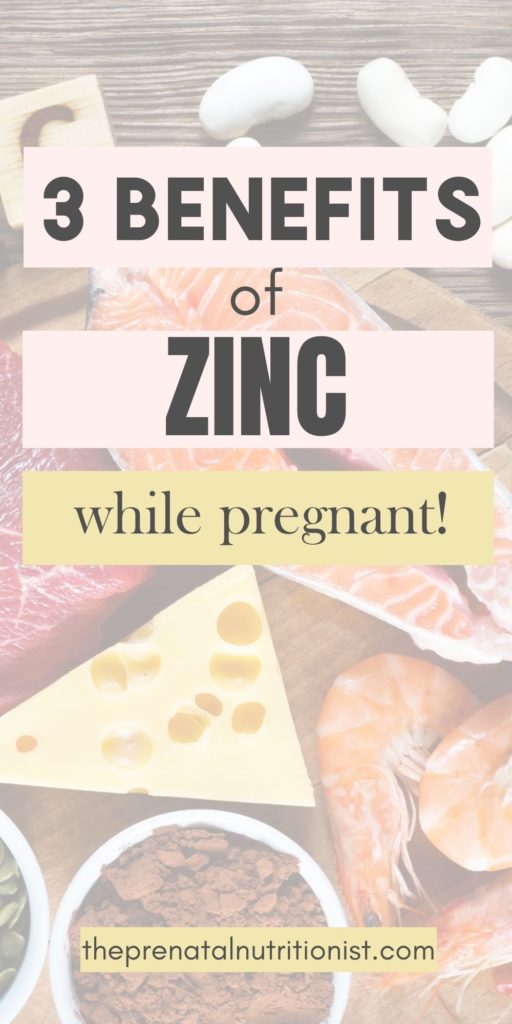
Benefits Of Zinc During Pregnancy
Immune Support
Zinc is needed to activate T-cells, which are necessary for optimal immune function. Additionally, zinc supports immune health by helping to reduce oxidative stress markers and inflammatory cytokines.
Supports DNA and Protein Synthesis
Zinc plays an important role in cell division and cell growth. These functions make it a crucial nutrient for pregnancy. Protein provides the building blocks for your baby.
Potential To Reduce Preterm Birth Risk
This is an ongoing study area, but some studies suggest that getting enough zinc during pregnancy may help slightly reduce preterm births. Many women in their childbearing years have mild to moderate zinc deficiency. Zinc deficiency may be a potential cause or contributing factor to preterm birth.
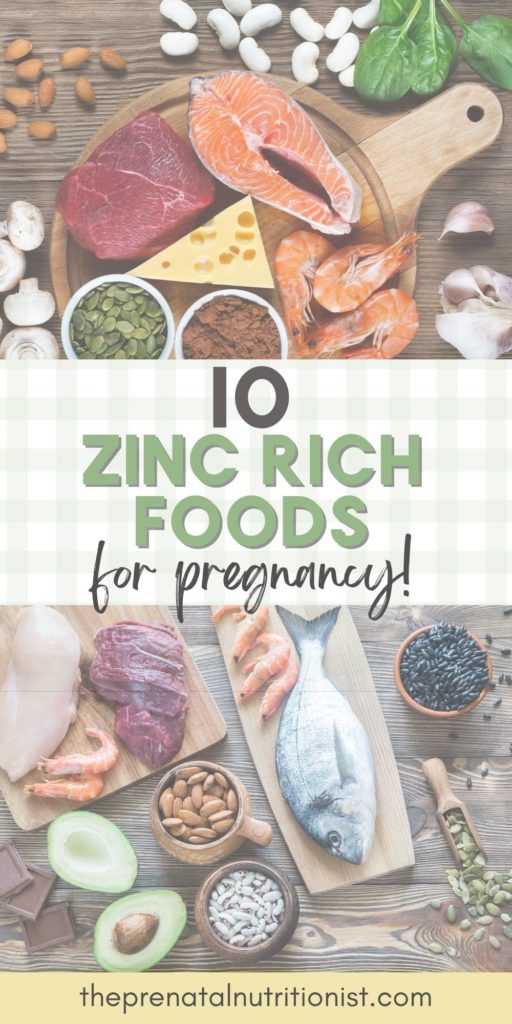
10 Zinc-Rich Foods During Pregnancy
Shellfish
Shellfish are good sources of zinc during pregnancy. They also give pregnant people many important vitamins, minerals, and macronutrients, including protein and iron. The omega-3 fatty acids found in some types of shellfish can help support your baby’s brain development, too!
Alaska king crabs and oysters are especially nutritious options for pregnant women. A mere three ounces of cooked Alaska king crab contains about 6.5 mg of zinc.
Oysters are one of the richest food sources of zinc. Three medium-sized oysters provide about 16 milligrams of zinc, over 100% of your recommended daily intake. Avoid eating raw oysters during pregnancy because of the risk of contracting a foodborne illness. However, cooked oysters are a safe and beneficial option for pregnancy.
Meat
Eating meat is another way to meet zinc needs during pregnancy. Red meat, in particular, contains a good amount of zinc, protein, and iron. Three ounces of cooked beef chuck roast contains 8 milligrams of zinc.
Other types of meat, like lamb, pork chops, and dark meat chicken, also provide zinc. Three ounces of lamb provides 4 mg of zinc, three ounces of cooked pork provides 3.18 mg, and three ounces of dark meat chicken provides 1.65 mg of zinc.
Legumes
Legumes also provide a plant-based boost of zinc. One serving of chickpeas (100 grams or 3.5 ounces) contains 1.5 mg of zinc. A half-cup of kidney beans provides 0.6 mg of zinc. Baked beans offer 1.33 mg of zinc.
Legumes are also great plant-based protein, fiber, folate, non-heme iron, and calcium sources.
Seeds
Adding seeds to your pregnancy diet is another easy way to meet your recommended daily amount of zinc. One tablespoon of sesame seeds contains 0.7 mg of zinc.
Additionally, a one-ounce serving of pumpkin seeds provides 2.2 mg or 20 percent of the recommended daily value of zinc, while three tablespoons of hemp seeds provide 2.97 mg of zinc.
Seeds are fantastic sources of additional protein, healthy fats, magnesium, and folate. Healthy fats support your baby’s brain development.
Nuts
Nuts can also help pregnant women reach the recommended daily amount of zinc. One ounce of dry-roasted cashews contains 1.6 mg of zinc, while the same amount of dry-roasted almonds has 0.9 mg.
Like seeds, nuts contain fiber, protein, and healthy fats. They are nutrient-dense and easy to take on the go making them a great snack for pregnant women. You don’t have to eat many of them to feel full, and cashews may help keep nausea or morning sickness at bay due to vitamin B6.
Whole Grains
Whole grains are another source of zinc. One serving of quinoa (1 cup cooked) contains slightly over 2 mg of zinc. It also offers non-heme iron, plant-based protein, and fiber.
Other whole grains that provide some zinc include brown rice, oatmeal, barley, and bulgur.
Dairy
Several dairy products can help pregnant women reach their recommended daily amount of zinc. Eight ounces of whole-milk yogurt provides as much as 1.7 mg of zinc, while 8 ounces of whole milk contains 1 mg of zinc. If you enjoy cheese, 1 ounce of cheddar or mozzarella cheese contains 0.9 mg of zinc. These dairy products are also good sources of protein, calcium, and potentially vitamin D (when fortified).
Lentils
Pregnant women can also benefit from including lentils in their diet. Lentils are supremely nutritious and offer numerous health benefits. This plant-based protein is rich in fiber and several micronutrients, including zinc. One cup of cooked lentils provides 2.52 mg of zinc.
Dark Chocolate
One surprising source of zinc is dark chocolate. This is a real win if you crave something sweet like chocolate during pregnancy. A 3 oz. bar of dark chocolate (70 – 85% cocoa) contains around 3.31 mg of zinc. However, you still want to enjoy chocolate in moderation and do not rely on it as your main source of zinc.
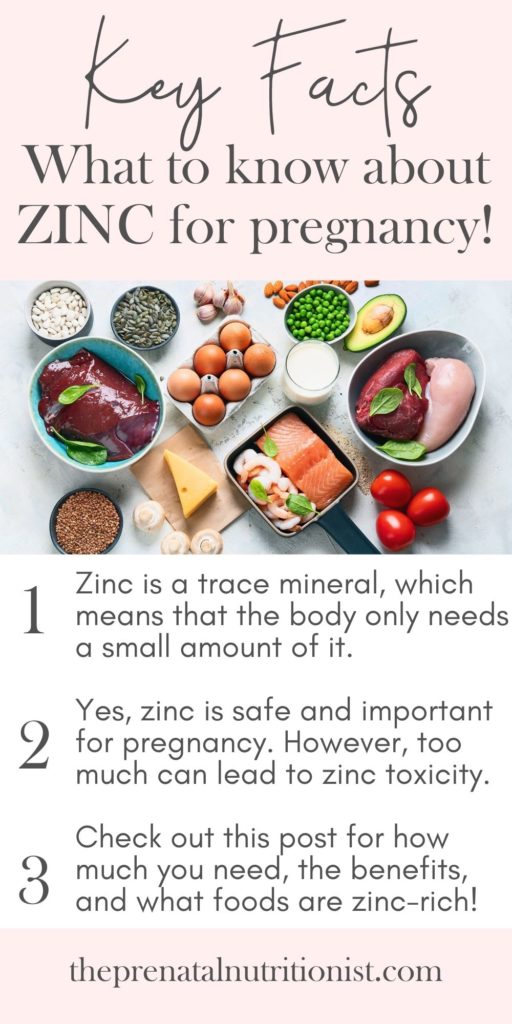
Zinc from naturally occurring, whole food sources is safe and beneficial during pregnancy.
If you are concerned about the amount of zinc you get during pregnancy, I recommend you first talk to your doctor or a registered dietitian specializing in pregnancy nutrition. It’s ideal (and safest) to focus on getting most of your recommended amount of zinc from a healthy, well-balanced diet that includes several of the zinc-rich foods mentioned above. Additionally, choose a prenatal vitamin that includes zinc.
To learn more about safe foods to enjoy during pregnancy and which ones to avoid, check out my other blog posts, like “Is Elderberry Safe During Pregnancy” or “Is Kombucha Safe During Pregnancy.”
You will find HUNDREDS of guides on nutrition for preconception through pregnancy when you join The Prenatal Nutrition Library. Using the most up-to-date nutrition science, TPNL gives you clear, real-life answers to guide you through a healthy, feel-good pregnancy. Click here to learn more and join today!
